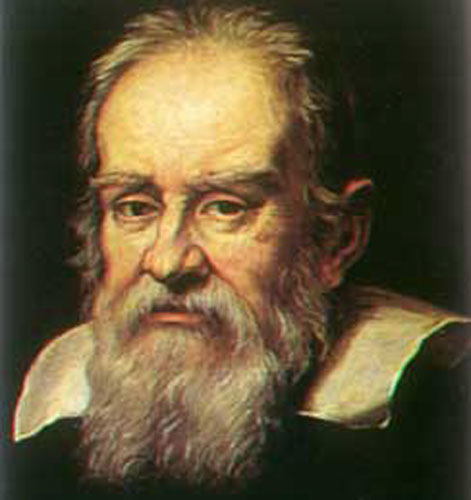
Today I'm celebrating the achievements of Galileo on his birthday
Galileo Galilei (1564-1642) was an extraordinary scientist who is recognized for his life of scientific experimentation and demonstration. He is often called the father of modern observational astronomy, the father of modern physics, and the father of modern science. You may recall a moment on an episode of the West Wing tv show when some accomplishments of Galileo were recalled. Galileo, a devout Catholic, was in a lot of trouble for his beliefs and proof that the planets rotated around the sun, due to interpretation of the Biblical scriptures. He was condemned and sentenced to house arrest for heresy for his teachings about the movement of the Earth and the rotation of the planets around the sun. His teachings were declared as absurb, false, and an error of faith. He died while under house arrest. In 1992, Pope John Paul II finally admitted the error made by theologians of the time concerning Galileo's charges and his conviction of heresy.
In addition to the proof that the planets rotate around the sun, we owe a lot to Galileo: discovery of the four largest moons of Jupiter, observation and analysis of sunspots, improvements in compass design, improvement of the telescope, improvement of the microscope, identification of lunar mountains and craters, the correct mathematical law for acceleraton, understanding the Milky Way as a multitude of densely packed stars, and understanding the rings around Saturn. He was also an inventor of mechanical devices, such as a pump, a hydrostatic balance, and early development of the thermometer. He is known for his discoveries in physics related to the motions of bodies and the laws of nature, particularly concerning falling objects and gravity fields. He performed experiments by dropping objects from the Tower of Pisa and rolling balls down gently sloping inclined planes. He has studied movement of the pendulum, measured the speed of light, and studied sound frequency. You can test your knowledge about his discoveries and replicate some experiments of Galileo online at Galileo's Experiments, with neat interactive demonstrations related to falling objects, projectiles, inclined planes, and pendulums.
One of the most famous references to Galileo's experiments was by the crew of Apollo 15. Here's the footage of an experiment reportedly performed on the moon by the crew of Apollo 15, testing the findings of Galileo concerning falling objects and gravity:
As posted on YouTube by nikzane
I was unaware of the link between science and music in Galileo's life and the achievements of Galileo's father. However, I'm also surprised at the inspiration of Galileo in modern music. Here's a link to a creative animation describing the troubles of Galileo due to his teachings and publications, featuring the song Bohemian Rhapsody by Queen, probably one of the most famous songs referencing Galileo. You can see the Indigo Girls singing their song Galileo on YouTube. Here's a link to a music video of Declan O'Rourke singing his song Galileo, an interesting song about questions of love and the mysteries of the sky. Here's also a link to a video created to Amy Grant's song Galileo. So much musical inspiration by an early scientist, misunderstood in his day, but so pivotal to the scientific developments of that century!
For more information about Galileo and his accomplishments:
The Galileo Project by Rice University
A PBS site on Galileo
Today I'm reminded of the accomplishments of the early scientists and their discoveries in areas that we just take for granted. I don't understand much of the technology that I use every day. When I had the flu, I did not think about how that thermometer was developed. When I drive my car, I don't think about its acceleration and how that compass on the rearview mirror actually works. I don't think about how the pictures and sound are relayed to my tv, how the light is generated when I flip the switch, and how power is delivered to my home. I know that my life is greatly inconvenienced when these technological developments (and still luxuries to many in the world) are unavailable. Today, I'm thankful for people like Galileo who had the courage to learn, to experiment, to publish, and to invent, often at great personal cost.
Image credit: Galileo portrait believed to be in public domain but acquired here
Friday, February 15, 2008
Watching for falling objects, as the world turns, and as the pendulum swings
Subscribe to:
Post Comments (Atom)



No comments:
Post a Comment